Hi everybody, welcome to the scuba diver magazine channel all of you wonderful scuba divers out there. Today we’re looking at my Top 10 Scuba Bad Habits, not necessarily my personal worst diving habits, although I have certainly done some of these in my diving career.
Just a handful of things that I’ve seen around dive sites that should really stop because while some might seem innocuous, in some circumstances and multiple ones added together, divers can get badly hurt.
Now, there’s no shame here, we’re all here to learn and have some fun. So, if you recognize yourself in any of these categories, just consider the effects it may have and think about correcting that bad habit…

Skipping the Buddy Check
This is by far the most common bad habit that scuba divers do, or don’t do. Buddy checks are there for a reason guys. Yes, they can get repetitive real-fast but, they have a very important role in scuba diving.
You know why you sit on the airplane for so darn long before you even start moving?
Because the pilot and crew are checking over the plane. Would you fly on a plane if they checked it as much as you checked your dive gear?

I don’t care what acronym you use, run through everything with your buddy and check that your ABCs are working.
A for air, check your tank valve is open and you can breathe from your regulators. The best way to check this is to watch that pressure gauge needle while you breathe.
B is buoyancy, check your BCD inflates and deflates.
C for Clips, check that everything is done up properly and isn’t going to fall off as soon as you jump in the water. Take that extra step to check every diver's equipment and make sure that you're both set up correctly.

Beyond Training
This is the Dunning Krueger effect, or the more modern F around and find out. ‘Ah, I’ll just go a little bit deeper, it’s not that far’ or ‘I’ll just swim into this cave, what’s the worst that can happen?’ Bad things, bad things can happen.
There’s a reason why there are so many specialty courses, they’re not all just to make more money. Your introductory course qualifies you down to around 18m, the next 30m, and there’s a reason why there are these depth restrictions and not just carte-blanche.

So many things change with very little increase in depth and the danger level has a steep incline, especially when you head into over-head environments. If you routinely go a little deeper because, nothing bad has happened yet, other scuba divers go there or you’ve seen something shiny, stop it.
Because the time will come when you are caught out because you don’t have the training or equipment to go somewhere underwater and you can get hurt. And the worst thing is that it will usually void your insurance also and you're left to cover any bills.

Bumping Into Things
This one bugs so many divers, myself included. One of the main things that divers are, or at least should be taught, is to not touch anything underwater. Yet we still see divers bumbling into things underwater or picking things up, I’m not sure which is worst.
Now, everybody makes mistakes, I’ve bumped into things before by accident but, it’s usually tapping the walls of a shipwreck, I stay well clear of anything fragile and think about where my fins are going.

Some divers just barrel into huge coral formations, destroy hundreds of years of growth with a single fin kick. Some divers pick things up, which can be extremely dangerous. Remember that a lot of critters underwater have extremely potent venoms or sharp teeth and spines that are a great way of getting a bacterial infection.
And anybody who’s brushed up against fire coral, myself included, will attest to how much that sucks for weeks to come. It’s not just an annoying itch for a few hours, fire coral can last for weeks and sometimes require surgery

Swimming Upright
I’ll admit it, you don’t get nearly enough time to learn how or even if you’re horizontal in the water during foundational courses. BCDs are all designed so that they work best when you’re horizontal in the water and too many divers are head up when they’re diving.
This means that you’re constantly swimming upwards and have to change your depth all of the time and you’re also swimming into more drag, wasting more energy.
Take some time to practice what it feels like to actually be horizontal on your front by laying on a bench. If you search online for a sidemount course you’ll find a bunch of pictures and videos of students laying face down on a table or bench.
Once you get used to how face down it should feel, you can start playing about with where your lead is located. You can move some lead from your waist up to trim weight pouches or your cam band. Just have a play about and try to be more horizontal in the water if you can.

Diving as Deep as Possible
During the dive brief you’re told what the max depth will be for the particular dive and so many divers plunge straight down, watching their depth gauge so they get to the exact mm depth and just stay there. Then 20 minutes later they wonder why they’re so low on gas compared to other divers.
If there’s something to see down there then great but, if there’s no need to be at 30m, you’ll find me at a shallower depth.
It’s warmer, it’s brighter and most importantly, the pressure is much less so I’m breathing less gas with each lungful. Depth isn’t a requirement for most dives.
You don’t have to go as deep as possible, the only thing you get is that you write a larger number in your logbook and more time on a stop on the way back to the surface because you’ve been guzzling all of that extra nitrogen.

Pull in the Slack
Ropes and string in the water are evil things, they are always out to get you and tie you up. If you’re dealing with line from a reel or a spool, keep that line taught. If you allow that line to slack, it will drift and tangle something up and they absolutely love your cylinder valve and 1st stage.
When you’re ascending on a dSMB, keep up with winding that line. It’s really easy to ascend faster than you can wind it in and end up surfacing in a nest of tangled line.

Also try not to tend the tide, if there’s water movement it’s quite easy to continue to pay out line when you feel like it’s pulling. However, if you keep paying out line, you’re going to be here in the water while your buoy is going to be all the way over here.
Not only will that increase the chances of boat strikes because they’re keeping away from the buoy and you’re also going to surface with tons of line that you now have to wind in while others surface around you

Surface ASAP
As soon as a lot of divers reach the safety stop phase and their dive computer starts counting down three minutes, they switch off and the dive is over for them. At that point it’s like a race to the surface as soon as that countdown ends.
Remember that dive computers are approximations, they’re not 100% accurate, and everybody’s body is different, the conditions of the dive are different and the amount of decompression you need will be different.
Dive computers and algorithms are set up to allow some extra conservatism. But you don’t know how close to that line you are actually getting. Just because your dive computer says that everything is fine for you to ascend.
Doesn’t mean that there’s no chance of you getting a DCI. If you still have breathing gas and you can comfortably stay on a stop, then don’t rush to the surface. Those extra few minutes could be the difference between surfacing normally, and having some form of decompression illness, deserved or undeserved.

Gear Rejection
This one can be funny and strangely puzzling when you think about it.
What’s the first thing that many divers do as soon as they reach the surface after a dive?
They take their mask off. Why?
Sure it can be nice to rub your face after a long dive but, it’s so easy to lose a mask on the surface and it’s the one piece of equipment that is specifically designed to keep sea water out of your eyes and nose.
A piece of equipment that’s designed to keep sea water out of your eyes and nose would be really useful when a wave splashes you in the face.
Divers forget to use their BCD and just tread water on the surface, they spit their regulator out, that will be really handy should your BCD malfunction and you need to breathe underwater for a while to fix the problem.
Try not to automatically take all of your gear off as soon as you reach the surface. People often talk about the benefits of a snorkel so that you can breathe on the surface to keep the water out of your mouth. But, do you know what’s even better than a snorkel? A Regulator.

Living through the viewfinder
Cameras and scuba divers are not always a good mix. It’s bad enough when a dive guide points out a fancy nudibranch or a shark sleeping under an outcropping, the entire group all crams in for a peek and you’ve got arms and fins flailing around as everybody tries to back out.
But, add a camera or two into the mix and all most divers will see is their backside while they chase the shark away trying to get a better snapshot.

Not only does it make the dive a bit rubbish for other divers around them but, it can’t be much fun only viewing a tiny square of this entire underwater world that we’re exploring.
Now, I’m not saying don’t take a camera or share videos because I love it when I see some of the pictures and videos that divers take underwater. Just try not to spend the entire dive with your eye up to the viewfinder.

Precarious Placements
There are fines for this on most dive sites but, leaving heavy dive equipment standing up on benches is a really bad habit that divers need to get out of. A cylinder standing up by itself is just begging to fall over. Not even just on a boat, you can find the flattest, most levelest piece of land and that cylinder can and will fall over, right onto your toes.
The worst thing is that you usually have an expensive regulator attached to the top of that cylinder. Tanks and lead weights belong on the floor, laid down and secure so they stay where you leave them. Masks, dive computers, other miscellaneous dive equipment is placed somewhere sensible.
If you put your mask on the bench, somebody is going to sit on it or plant their cylinder ontop of it. If you leave it on the side of a RIB or somewhere precarious, it will fall off and into the water. Take an extra moment to think about where you’re putting your stuff before you need to buy a new one or pay the beer fine.
So, yeah most of these Top 10 Scuba Bad Habit fixes are just tightening your belt and doing things that you were taught in your foundational course. Some things your Instructor may have overlooked but, you know them now so, you have no excuse not to do any of these.
It’s all about being as diligent and as prudent as possible. If you can prevent an accident beforehand by running through your buddy check or avoid the embarrassment of not wearing your weightbelt and needing to haul your butt back onto the boat to put it on, then it’s time well spent.
Take your time with scuba diving and go that extra step.
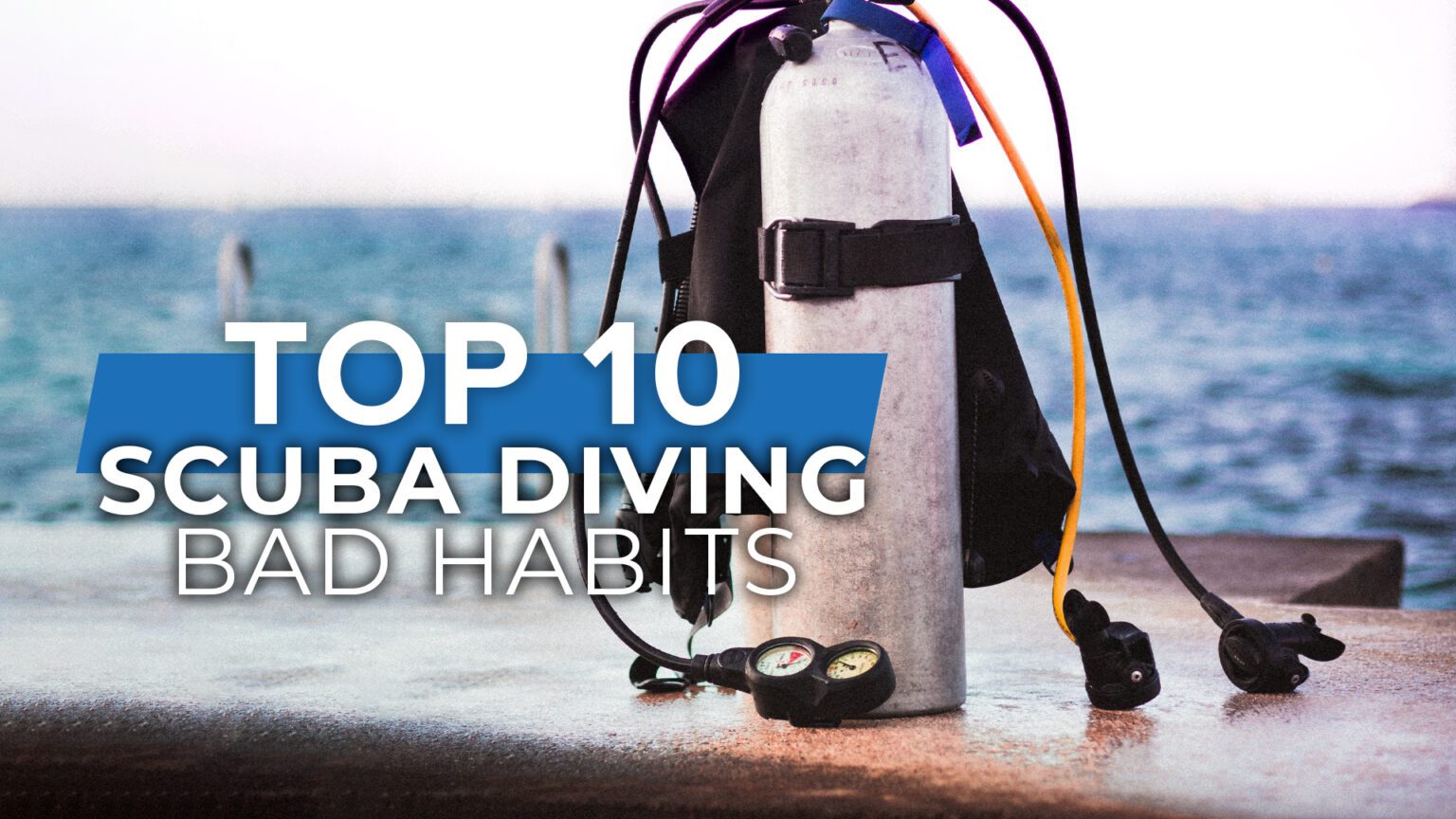


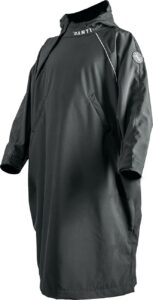
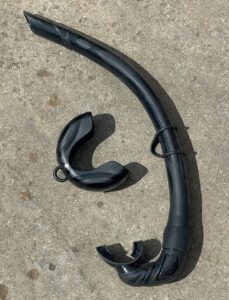
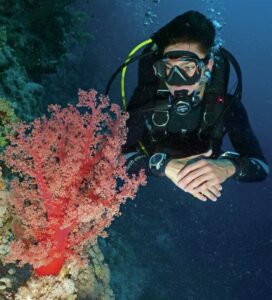


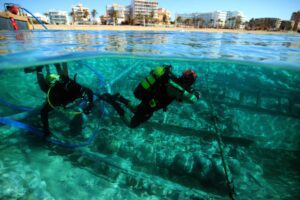
Mark – I would add one more which I think is very high priority. Divers not monitoring their gas supply. We carry gauges or have a computer linked to our first stage but the fool things don’t read themselves. We as divers have the responsibility to do that ourselves.
As an instructor I had a game called “Hands Up” where I would point my two index fingers at the diver and they were to place their hands up then count to me the amount of gas they had. Silly but if they reached for their gauge I would then pepper them with fake bullets to let them know that they need to have a good estimate of their gas at all times.
Not knowing your gas supply status is a extremely bad habit.